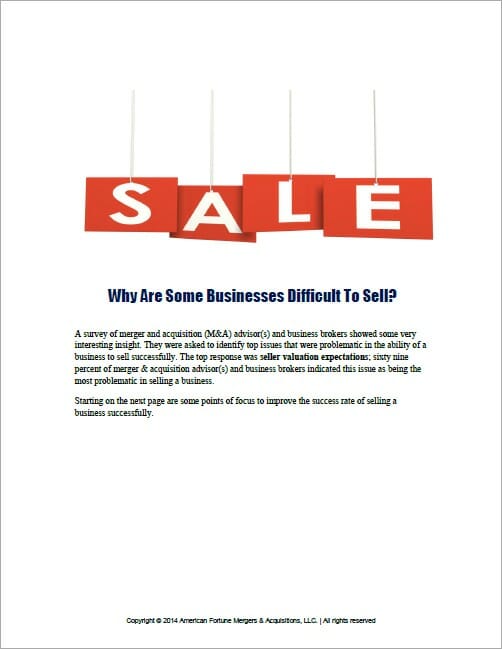 Business Valuation Services
Business Valuation Services
Our business valuation services are made up of two parts: a subjective approach taking into account market forces, and an objective analysis that looks at the cold hard facts. The majority of the time when people think about a business valuation, they think about objective factors. However, when a buyer is considering buying a business, it is those subjective, ‘soft’ aspects that can make or break a business valuation. The subjective aspects of a business tell a buyer if a business is a great investment, or too risky to purchase. Your business valuation services provider will provide more details about this area.
The Valuation Process
Let’s start with the numbers. The first part of a business valuation is the objective analysis, dealing with quantifiable data drivers. These pieces are easily measurable and provable, such as profits, or the standard accounting term called Earnings Before Interest Depreciation Taxes Amortization (EBIDTA), and other quantifiable items such as the market value of physical assets. From a simplistic approach, business valuation service experts can take EBIDTA, apply the market-driven capitalization rate, and arrive with a relatively good ballpark business valuation. In this case, the conclusion is simple: the valuation expert can easily correlate the fact that the higher the EBIDTA, the higher the valuation of the business and vice versa.
The second part of the business valuation is the subjective analysis, dealing with those ‘soft’ drivers that are market-driven. These parts are much more difficult to measure and quantify. Some examples of these valuation drivers might be the fact that a business has forty percent of its revenue from one customer; or that it is dependent on only one, two or three products (services). A business where the owner is the business or the business is family operated, or even the threats faced by increased globalization are all examples of subjective risks that must be taken into account in a business valuation. These factors and their effects on investment risks are more difficult to predict and must take market forces into account. In some cases, they can even result in lowering the business valuation. All these negative subjective drivers will definitely end up lowering the valuation of a business. But how can a business owner know what a negative value driver really is? The ones listed here are only a few examples.
An expert business valuation services specialist will also be able to help. First of all, find a business valuation specialist who really knows the objective and quantitative aspects of business valuations. Second, and crucial to a strong, defensible valuation, find a business valuation services specialist who is knowledgeable about market forces. Someone with in-depth knowledge of the haws and what’s of today’s business sale market can help you evaluate the soft, subjective valuation drivers. An expert business valuation specialist will work together with you, identifying the objective, data-driven strengths of your business and educating you on the subjective drivers that could be pulling your business valuation down. That way, your business valuation services specialist can analyze and apply the right amount of subjective forces in terms of discounts against the objective valuation drivers to arrive with an accurate and defensible business valuation. Once you know which soft factors are pulling down the value of your business, you can proactively take steps to fix them. It is important to take charge of these soft factors at least 1-3 years prior to putting a business on the market. By changing and correcting these negative drags on the value of your business, it’s not unusual to have the worth of your business improve by as much as fifty percent.
A Typical Business Valuation Example:
Bill had a very profitable business providing industrial inspection services. He decided to look up the multiples and was very excited at what he thought his industrial inspection services business was worth. He happily paid his accountant a large sum for professional business valuation services. However, his business didn’t sell. Time and time again potential buyers backed off, saying his business was overpriced. After having his industrial inspection services business on the market unsold for several years, in frustration, he decided to find another business valuation services expert to get another business valuation done. This time, he found a great mergers and acquisitions firm that also specialized in business valuation services. This specialist was knowledgeable about the business sale market because he dealt with it every day. He was shocked when his valuation came in just under $2 million dollars, vastly lower than the expensive valuation produced by his trusted accountant. A bit wiser this time, Bill decided to work closely with this mergers & acquisitions services firm to identify and correct the subjective, soft, factors that were dragging down his business valuation. Once the subjective drivers were corrected the value of his industrial inspection services business was increased to $3 million dollars and it sold seven months later for $2.9 million dollars.
A Valuation Is Not Just About the Financials
Financials do play a key role in a business valuation, they are normally the first place that a business valuation services expert starts when doing a business valuation. But often non-financial information can be more important in determining the value of a business. The reality is that many of the key valuation drivers do not appear on the Financial Statements, therefore it is very important to fully consider the company’s operation and since businesses do not operate in a vacuum it’s very important to consider its competitors as well as the well being of the economy and future economic projections.
Impact of Employees on a Business Valuation How reliant is the business upon the owner’s skills, experience, and their relationships with the company’s customers? Is the owner(s) the business? Are most of these factors transferable or does the goodwill go away if the owner(s) sells the business? And are there key employees in place that are hard to replace, and or would their loss harm sales and profits?
Impact of Products and Services on a Business Valuation How vulnerable are the company’s products or services to economic changes, regulatory or legislative changes? How exclusive are the products or services in the marketplace or is there strong competition out there now or on the horizon? Does the company have supply contracts with its key suppliers and does the company have contracts in place with customers to ensure profitability for the future?
Impact of Premises and Facilities on a Business Valuation Does the company have a good property lease in place if the business facilities are leased? If the property is leased, what are the terms of the lease, is the rent price reasonable and when does the lease renew? Does the property (facility) have additional capacity for additional growth? If the conditions are not right, it may pose a long-term risk and a disadvantage for a new owner. In addition to lease factors are there other obligations that the tenant has, such as rate increases, insurances, repairs, refurbishment? Is the lease a Net Lease or a Triple Net Lease?
Impact of Marketing on a Business Valuation What marketing strategies does the company utilize? Is it reliant on the internet, print ads, direct mail, database marketing, and PR initiatives? Does the company have strong mission and value statements that are incorporated in all of its branding and marketing initiatives? Is there room for improvement?
Impact of Plant and Equipment on a Business Valuation Is the facility and equipment it in good shape or does it need major repair, replacing or upgrading in the near future? Are technology changes and advances impacting machinery requirements for the business and the future cost impact? For some industries repairs and maintenance can be a major cost and an unwelcome surprise if it has been deferred.
Impact of Intangibles on a Business Valuation Most business valuation services are of the opinion that tangible valuation factors can range from 25% to 70% which no doubt have a huge effect on the value of a business. These factors are non-physical items but can be tremendously important to the generation of revenue/profits and provide a core competitive advantage in the marketplace. Many of these intangibles can be transferred (e.g. patents, trademarks, franchises, leases, supply contracts etc.) but some might be difficult to transfer or may not be capable of being transferred to a new owner. Customer relationships, a trained workforce, company culture and brand awareness which may be key profit drivers but not easily passed on.
Why a Valuation Multiple Varies
Three reasons why a business valuation multiple can vary:
Differences in the quality of the business, accounting differences and fluctuations in cash flow or profit.
1. Differences in the Quality of a Business
All things being equal, higher quality businesses will naturally receive higher valuation multiples. From an objective perspective is there are inherent quantitative differences in the key drivers of a business valuation. These key drivers include such factors as quality of management, available investment opportunities, strategy, and branding. These key drivers can be reduced to four quantitative valuation drivers: return on capital, cost of capital, growth, and duration of growth. Investors are interested as to how to allow for differences in these value drivers. They want to know how much is growth worth? They also want to know the impact of a change in return on capital?
2. Accounting Differences
There are accounting practices that do not affect cash flow and therefore do not affect the value of a business. However there are some accounting practices that do affect profit multiples and, as a result, differences in multiples can present a false picture of a valuation of a business. Unfortunately, it is not possible to eliminate all accounting differences, therefore, investors and analysts should look to using valuation statistics that are least likely to be distorted by accounting differences. So this means focusing more on cash flow instead of profit information, and where the profits are used by taking numbers from higher up the income statement. In doing so one has to be very careful since there is a threat that the key parts of a business performance can be omitted, therefore these stats need be used with care and preferably not independently of each other.
Cash flow:
The advantage of using cash flow as a key input for a business valuation is that it can be completely independent of the accounting method in place. However, the use of cash flow can be somewhat problematic since it normally varies year to year and therefore it is not always a good basis for predicting the future. This can be mitigated by using forecast cash flows since this volatility diminishes; cash flow is more appropriate to Discounted Cash Flow valuations than to performance measurements and valuation multiples.
Revenue:
Revenue has typically been promoted as a good use for analysis and valuation on the basis that it is quite capable for use on many different accounting systems. However, there are two issues with this approach:
Revenues are more affected by accounting policies than was commonly thought, in reality, revenues can be significantly affected by different use of accounting standards, on the bright side, they are not as problematic as for-profit measurements. Since revenue is not a complete measure of performance due to its lack of concern on profitability and cash flow it should be a used as a last resort if other more suited profit measurements are not available or not reliable.
EBITDA:
EBITDA has come to be the most prevalent measurement of performance and value which many business valuation services and investors believe to substantially reduce the problem of accounting differences. It is a common belief that the measurement is not affected by differences in depreciation methods, goodwill accounting, and deferred tax. However, there are some accounting issues that do impact EBITDA but in lieu of these, it provides a useful form of measurement. The drawback of EBITDA is that consider the costs of capital spending which affect a business valuation.
Operating free cash flow (OpFCF):
OpFCF is a modified version of EBITDA created to
designed to preserve the benefits that EBITDA provides in accounting comparability but it helps to eliminate the issue of not considering the differences in capital spending and maintenance capex. Maintenance capex is the amount an analyst determines that needs to be spent on fixed assets to maintain profits and competitive position of the business.
3. Fluctuations in Profits
Business valuation multiples are only useful if the profit statistic used is representative of the future. Profit changes up or down have a substantial impact on valuation multiples. Single point valuation multiples can be misleading especially for businesses with cyclical variations in which cash flow can be highly erratic.
Dealing with Profit Fluctuations A valuation multiple is useful if the profit on which it is based is indicative of future profit potential. If future profit is not indicative of the future than the business valuation services expert and investor needs to exclude exceptional items when using historical profits or to utilize forecasts without the consideration of historical profits. When current and future years profits are not representative of the longer term projections then the business valuation services expert and investor should use a normalized profit or cash flow or think about using the “forward valuation priced’ multiples”.
In summary, a business valuation is much more complex than most people realize.
Which Valuation of a Business Right for Me?
Choosing the right valuations report depends on three factors: 1) the need and requirement for details, 2) how strongly will the valuation have to be defended, 3) the purpose of the valuation of a business.
American Fortune Business Valuation Services provides the following valuation reports:
Calculation of Value
This Calculation of Value report takes basic value drivers to produce a semi-formal valuation. It utilizes four valuation methodologies. This type of valuation yields a moderately defensible valuation report. The report is 40-43 pages. Price: $2,700. To view a sample Calculation of Value – Request Sample
Comprehensive Business Valuation
A comprehensive business valuation that incorporates broad and complex business reviews, financial reviews and analysis. This valuation is very defensible. It utilizes seven valuation methodologies. This valuation is very accurate and very defensible. The report is 50-55 pages. Price: $4,000. To view a sample formal valuation – Request Sample
Why Use American Fortune for Business Valuation Services?
Because American Fortune also provides Mergers & Acquisitions services, we possess greater business valuation knowledge and experience which makes business appraisal work easier for us and therefore we are able to offer prices on business valuations at 30-40% less than that of our competitors.
When procuring a business valuation report, make sure the valuation is built on a firm foundation that can withstand challenges. Finding the right business valuation services to value a business can make all the difference in obtaining an accurate and credible business valuation. American Fortune Business Valuation’s broad and unique expertise and experience results in the creation of very accurate, defensible and business valuation reports for the following purposes: wealth preservation, increasing wealth, sale of a business, business acquisitions, divorce, business loans, estate planning, buy out agreements or business exit & succession planning. Since the firm also performs Mergers & Acquisitions Services and Business Exit Planning they poses expertise and experience that most business valuation firms do not poses. Because American Fortune Business Valuation firm posses the additional expertise and experience it allows them to create very Accurate, Defensible and Low-Cost business valuation reports.
American Fortune Business Valuations follow the requirements as defined by the American Institute of Certified Public Accountants Statement on Standards for Appraisal Services No. 1 (SSVS No. 1) and performed in accordance with the Uniform Standards of Professional Appraisal Practice (USPAP) as promoted by the Appraisal Foundation and the International Valuation Standards (IVS).
For more information on American Fortune business valuation services and sample reports, please contact us at 800-248-0615.






